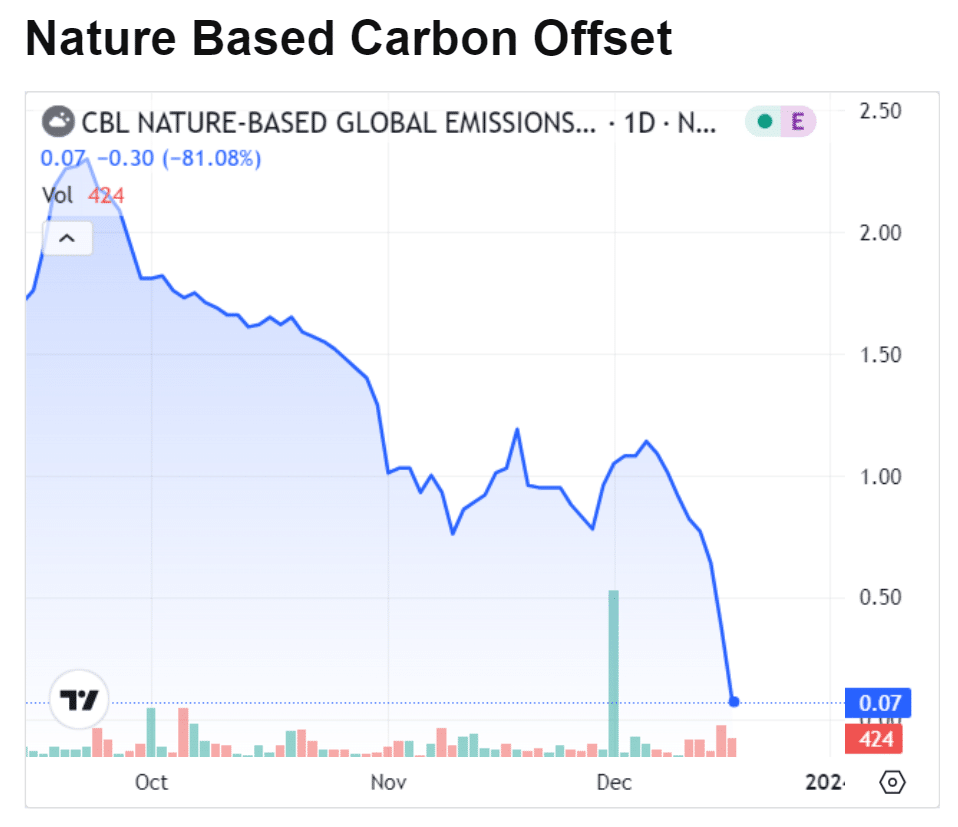Voluntary carbon credits have faced a significant downturn in prices, casting the market under increased scrutiny. But compliance prices are set to soar, with Germany raising it to 50 euros while Canada also plans to increase in 2024.
Expectations were high that the recent COP28 conference would address concerns on carbon credit reliability by establishing regulatory measures. Yet, the attempt fell short, leading to carbon prices dropping to their lowest levels, particularly Nature Based Carbon Offsets (NGEO).
The Meltdown of NGEO Carbon Prices
Amid rising commitments to reach net zero emissions, companies have been purchasing carbon credits to offset their emissions. However, the market is currently experiencing a breakdown.
NGEO prices plummeted to a massive 81% in trading to its lowest level ever, at just $0.07.
Over the last 2 years, there has been a drastic drop in demand for credits, causing a sharp decline in prices.
The diminishing demand is attributed to the absence of standardized regulations governing carbon markets. Recent news and studies have raised concerns about the reliability of the system, emphasizing the lack of rules.
Carbon markets essentially enable the offsetting of carbon emissions through tradable entities – carbon credits. Each credit represents the removal or reduction of carbon dioxide from the atmosphere, achieved through actions like tree planting.
There are two types of carbon markets: mandatory and voluntary.
Mandatory or compliance markets are regulated by governments or international bodies using instruments like carbon taxes to regulate energy-intensive industries. On the other hand, voluntary markets allow companies and individuals to trade credits without compulsion. It is this voluntary sector that is currently under scrutiny.
Compliance Prices Set to Surge
Things in the compliance sector are taking a different turn. Germany, in particular, recently approved their aim to increase carbon prices by more than previously planned.
The country voted to raise a carbon levy on fossil fuels used in housing and transportation. The German government initially agreed to raise prices to 40 euros a ton in 2024. But the price is now set to reach 45 euros beginning next month, a 50% jump from its current price.
That figure will further rise to 50 euros in 2025. This new carbon price is part of the German’s nation deal to mitigate a budget crisis. It will also help fund Germany’s climate and transformation fund.
Over in Canada, the federal government also decided to bring up the carbon tax from $65 per tonne this 2023 to $75 in 2024.
Canada’s carbon price jumped by the most this year, going from $50 to $65 a tonne of carbon emissions. And this will continue at the rate of $10 a year increase until it reaches $170 per tonne in 2030.
Last month, the House of Commons was in a debate over an issue whether to ax the tax or not.
Canada’s NDP moved to scrape the carbon tax from all forms of home heating. The debate between the political parties on carving-out the carbon tax will impact the country in achieving its climate goals.
Where Hope for Voluntary Carbon Market Lies
A BloombergNEF report projected that the total value of carbon credits issued and sold for companies to achieve their decarbonization goals could reach $1 trillion by 2037. Under stricter supervision, where companies can only purchase vetted carbon credits, offset prices could surge to over $250 a ton.
Some key players cautioned about the voluntary market’s reliance on bilateral transactions for inexpensive credits, which may jeopardize its future.
They stressed the need for transparency, clear quality definitions, and easier access to high-quality supply, warning that upcoming years could mirror the challenges seen in 2022.
Hopes were pinned on a resolution in this regard during the COP28 conference. The climate summit was intended to address the issue, yet it proved unsuccessful.
- READ MORE: The Top 4 Important Highlights at COP28
The Paris Agreement’s Article 6, outlining rules for carbon trading, was anticipated to provide a solution. But countries failed to adopt these standards at the recent COP28 conference in Dubai.
As compliance prices set to surge in the near term, voluntary carbon credits, particularly the NGEO, face a crisis due to plummeting prices and lacking regulations. The COP28 conference failed to provide resolutions, leaving uncertainties around market reliability. Hopes are now betted on clearer regulations and greater transparency to stabilize these crucial markets amid mounting climate commitments.


